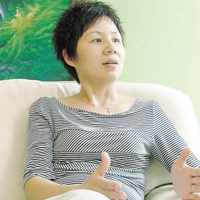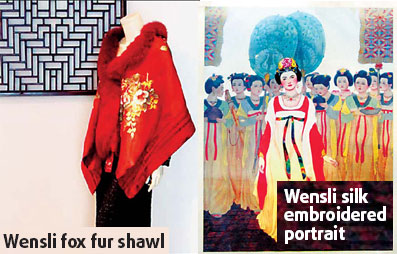Dressed in a green Max Mara jacket, Tu Hongyan did not start the conversation until she put a striped brown silk scarf around her shoulder.
After all, she is in the silk business, her mother founded one of China's largest silk companies by export volume and her husband holds a Bachelor's degree in silk studies.
 |
| Tu Hongyan |
However, the 37-year-old vice-president of Wensli says $60 million in silk export revenues is less than half of the company's total revenue. Although silk is still the core business of the Wensli Group, or the "root" of the company, as Tu says, it is not the part that it makes the most money. Rather the company based in Hangzhou, capital of Zhejiang province, makes more money from its real estate and pharmaceutical businesses.
Tu is the daughter of Shen Aiqin, the former president of the company who started the business in 1975. During the 1980s, Wensli was the largest silk exporter in China, selling hundreds of tons of silk every year and earning a bulk of the foreign reserves that China needed at that time. It is still the biggest silk maker in the province with over 150 silk enterprises.
But three decades later, the company is changing. "We don't want to be simply the biggest any more, we want to have our own brands and stay focused," says Tu.
According to Shen, who is also a vice-director of China's silk association, although China is the biggest silk maker in the world, most silk companies don't make much money. For instance, Zhejiang province alone produces half of the silk in the nation, but many companies are like Wensli and rely on other sectors to maintain the business.
Tu became Wensli's vice-president after a long period of training including her college education studying business management, a year in a textile company in Japan, and years of experience in a Wensli factory that began with working on sewing machines.
And her strategy of managing the company now is to rely on brand building, rather than simply relying on exports that her mother used to promote.
Wensli's corporate mentor has long been the Italian fashion icon Hermes. In fact, Wensli has been doing business with luxury brands such as Hermes for a long time. In 2000, it provided almost 90 percent of the company's silk.
Shen likes to say that China has the best silk in the world, and Hangzhou is known as the silk capital of China, with thousands of years of tradition of making the best silk in the country. "Our silk is the finest in the world, but it is a pity that Chinese people do not appreciate domestic brands," Shen says.
But Tu holds a different attitude towards people's preference for Hermes over Chinese products.
"Hermes' expertise has been developing for over 100 years. They have an endless of pursuit for quality, design and craftsmanship, but we lack that," says Tu. She says her years of working in a Japanese textile company was a valuable lesson on the importance of high quality and skills standards. Tu says Chinese silk exporters have been competing to offer the lowest prices for a long time. In 1993 and 1994 when the competition was the fiercest, a ton of silk was only worth 100,000 yuan and one could spent 10 yuan to buy three silk ties. A ton of silk from China is now priced at 300,000 yuan, while a Hermes scarf is priced at $400 or more.
"It seems that everyone can afford silk, from a businessman to a scavenger," says Tu. But the unregulated competition has also hurt the silk industry. Silk making is a complex process that requires time and hard work. It takes one year to grow the mulberry tree, and another year to transform the silkworm cocoons into silk and garments. Under the low price competition, Tu recalls, thousands of factories went bankrupt and tens of thousands of workers lost their jobs in Zhejiang.
Wensli has been lucky to survive the turmoil, and realized that it can only survive and flourish from establishing a high-profile brand and unique and superior designs.
But brand building hasn't been easy. For a long time, Shen and Tu have tried to build a brand targeting the middle end market. They have opened chain stores in many cities in China, but things did not run very well.
"We have leanred from our losses and we have learned valuable lessons," Tu says. Now, both the mother and the daughter are targeting the domestic high-end consumers, and they also make and design silk gifts.
Tu tries to appeal to urban upper middle class women in their 40s to 50s. She cites a real estate developer in Beijing who flew to Hangzhou once a year and spends 300,000 yuan for the company to design dresses and accessories for her.
Tu says she is in no hurry to build the brand and has decided that Wensli would not spend money on advertising. Instead, she takes praise from customers as the best ads for Wensli silk.
Tu says Wensli's biggest challenges are the designs. Tu has hired designers in China, but she is well aware of the shortage of good designers. Many students graduated from high school, and then spent one or two years in college, and Tu says they cannot compete with French designers who have been brought up in an environment with a tradition of art and design.

As a way to deal with the problem, Wensli has organized design competitions, and sent winners overseas for study. She also invites designers abroad to design for Wensli.
Tu admires her mother, who transformed the small township enterprise into one of the largest silk makers nationwide, but she says she has had to adopt different strategies in her own management.
"The judgment for good work in my mother's generation is that volume really matters," she says, But now, small can also be beautiful." Export volume of the company since she took the leadership role has not increased, and she spends most of her time promoting the brand.
"My mother has a real passion for silk, she just loves it," says Tu, adding she likes silk as well but is aware that she needs more innovation to do business than the last generation.
As for the process of brand building, she says companies like Hermes have spent several generations building brands, and Wensli is only 30 years old.
She compares the Wensli brand to a baby. "It has just learned how to walk, and does not know how to run yet." But she is confident that with all the hardships that the company has experienced, the work is well on its way.
|


